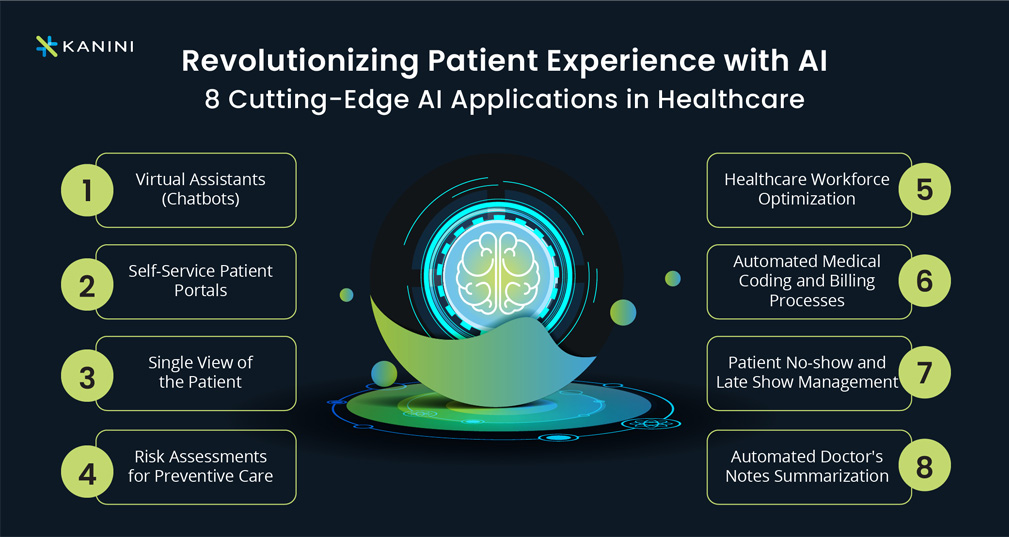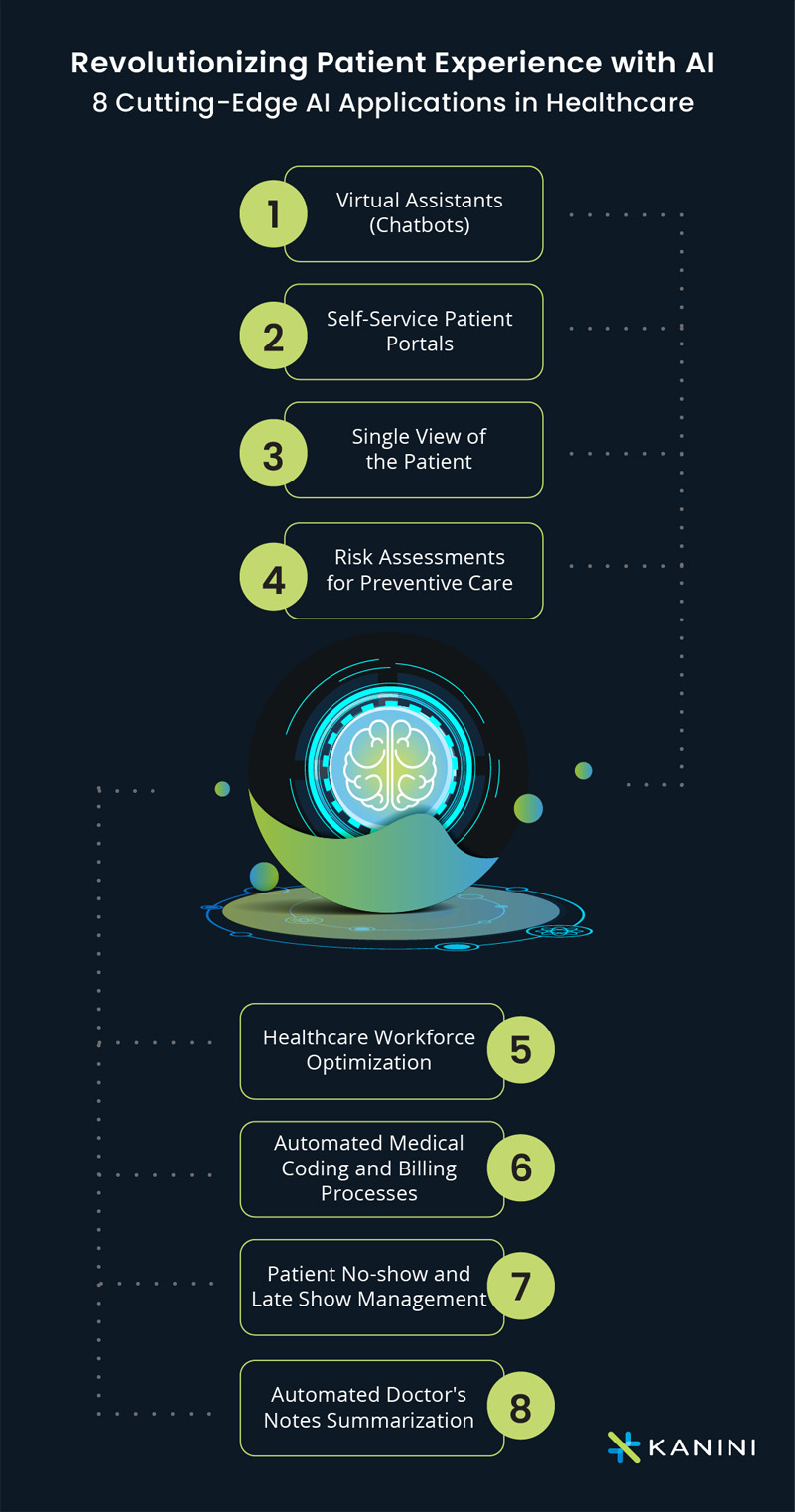The healthcare industry is undergoing a phenomenal technological transformation. It is increasingly realizing the revolutionary power of Artificial Intelligence (AI) in improving patient engagement and enhancing patient experience. Research shows that the total global AI in healthcare is estimated to reach USD 95.65 Billion by 2028 (Vantage Market Research). This phenomenal progress in AI adoption in healthcare predominantly stems from the increasing demand for faster digital solutions and instant gratification. As the healthcare industry strives to offer better experiences to patients and meet their rising expectations, traditional ways of engaging with patients and delivering care take a back seat. The technological revolution paves the way for sophisticated data systems that support AI and advanced analytics to automate processes, gain insights, and improve care quality. In this article, we’ll explore a few interesting use cases of AI in healthcare to demonstrate how this revolutionary technology enhances patient engagement and transforms patient experience.
Tap the full potential of AI to redefine your healthcare service delivery.
Let’s Look at the Top 8 AI Use Cases in Healthcare to Increase Patient Engagement and Transform Patient Experience
From proactively predicting patient needs to streamlining workflows and offering personalized patient care, many new use cases of AI are taking shape every day. Here are some of the ways in which AI is enabling the healthcare system to deliver better value in care to patients.


1. Intelligent Virtual Assistants (Chatbots)
Patients contact their healthcare provider seeking medical assistance, searching for an appropriate provider/doctor, scheduling appointments, and addressing various other needs. However, healthcare providers may not have the necessary staff to adequately assist customers with their inquiries. To ensure continuous support, healthcare providers can implement AI-powered Intelligent Virtual Assistants (Chatbots) to automate responses to patients’ simple inquiries and requests.
Patients can engage with these Chatbots through their preferred digital channel, receiving prompt answers to queries. These Chatbots effectively manage and resolve patient inquiries, minimizing manual intervention and collecting relevant patient information for appropriate resolutions. In cases where a virtual conversation necessitates escalation, patients can be seamlessly directed to the most appropriate channel and form of care. This allows healthcare providers to scale their services, particularly during periods of high-volume patient consultations.
Generative AI, powered by advanced natural language processing, takes the capabilities of an AI Chatbot a notch higher, enabling more nuanced conversations and allowing healthcare organizations to deliver personalized and accurate information to patients.
2. Intuitive Self-Service Patient Portals
Establishing self-service patient portals is pivotal in engaging with today’s digitally fluent patients who expect healthcare services to be easily accessible. From historical health records and lab reports to past appointment data, no-show/late show history, discharge summaries, immunizations, and healthcare provider’s notes, these enable patients to access relevant information and avail healthcare services from any connected device, at any time. By integrating advanced AI-driven features into these portals, healthcare providers can further elevate patient engagement, streamline processes, and enhance the overall patient experience. New-age self-service portals with an intuitive UI/UX offer some of the following features:
- Appointment Alerts: Alerting the patient on the next arriving appointment.
- Appointment Scheduling: Enabling patients to book, change, or cancel appointments anytime, anywhere.
- Doctor Recommendations: Recommending the most suitable, also the nearest, doctors to patients for consultation, and automatically presenting them with the choice of time slots.
- Cost Estimation: Giving patients an estimate of the cost involved for the consultation and other medical interventions.
- Payer and Claims-related Information: Helping patients to be ready with payer information for claim submissions.
- Personalized Insights: Offering personalized insights around health management to patients by analyzing their health data.
3. 360-degree View of the Patient
The healthcare industry is one of the most data-intensive industries. Data in healthcare gets generated via various channels such as patient registrations, EHR/EMR systems, doctor consultation notes, patient feedback, and patient claims details. The consolidation of patient data from multiple source systems is critical for healthcare providers to get a single (360-degree) view of a patient. AI enables providers to get this single view of patients and provide relevant and timely services to patients through the following:
- Screening large volume of consolidated patient data for insights.
- Tracking patient history across all the services they have solicited and serve their needs better.
- Getting additional patient intelligence in terms of improving future patient engagements.
- Using patient feedback to proactively address issues for other patients.
- Improving operational efficiency within the organization.
4. Risk Assessments for Preventive Care
AI-powered solutions offer invaluable insights for healthcare providers, particularly in the early detection of diseases such as cancer, diabetes, and coronary artery disease. By analyzing data from various sources, including X-rays and medical imagery, AI can help identify the patterns associated with the onset of such diseases.
Further, the integration of AI with smart devices, such as wearable smart bands, enables continuous monitoring of patients’ heart rates. This enables proactive health management and also serves as a warning system, alerting physicians, caregivers, or the patients themselves about an impending heart attack or stroke and potentially saving lives.
Here’s a real-life example:
A woman named Diane Feenstra, a native of Norton Shores in Michigan, owes her life to a smartwatch that she was wearing. The smartwatch identified irregular heart rate patterns through its heart monitoring system and cautioned her of an imminent heart attack. When rushed to the hospital, she learned that she had suffered a heart attack but was not aware of it. By knowing her condition from the intelligence provided by the AI-powered smartwatch, the doctor could give her appropriate care in time.
5. Healthcare Workforce Optimization
Patient experience suffers when there are prolonged delays and wait times. Leveraging advanced analytics and AI, providers can manage their resources more efficiently and address this challenge. By harnessing these technologies, healthcare professionals can pinpoint specific areas of delays and identify bottlenecks that may impede patient satisfaction. Through a data-driven intelligent solution, staff can efficiently allocate available physicians and provide timely consultation services.
Furthermore, the integration of an AI-powered workflow management platform can empower healthcare coordinators with automated workflows and minimize manual interventions. From follow-ups and consultation schedules to providing advice related to medicine dosages, these systems can automate end-to-end patient care processes for a holistic transformation of the patient experience.
6. Automation of Medical Coding and Billing Processes
Spelling errors, abbreviations, and other ambiguities make medical coding both time and resource-intensive. This is where AI-assisted medical coding solutions can become a game-changing asset for healthcare entities – automating medical coding assignments to bring in the highest level of precision and speed.
This extraordinary improvement in speed translates into quicker reimbursement processes and reduces financial stress for both providers and patients. Reduced errors minimize the potential for billing disputes, fostering a relationship of transparency and trust between the provider and patient. Most importantly, the improved accuracy and efficiency of medical coding enhances health outcomes as physicians can rely on a more complete and reliable understanding of a patient’s medical history, previous treatments, and ongoing health issues to make informed decisions. This minimizes the potential for treatment oversights and also allows a more personalized approach to patient care. Learn more
7. Patient No-show and Late Show Management
Patient no-shows cost the healthcare industry millions of dollars and redundant appointment scheduling practices lead to wasted resources, operational inefficiencies, and impaired decisions. All these gaps ultimately impact the patient experience. A web application with AI and data analytics capabilities to streamline the various patient management processes such as appointment scheduling, patient registrations, and EHR/EMR management can be one of the most significant AI use cases in healthcare. For example, modern appointment management systems with predictive analytics capabilities can anticipate patient no-shows or late arrivals, enabling providers to take proactive measures such as automatically waitlisting patients. This minimizes average waiting times, reduces the number of missed appointments, and ensures a more seamless, patient-centric care experience. Learn more
8. Automated Doctor’s Notes Summarization
Another interesting AI use case in healthcare is in the area of mental and behavioral health where healthcare practices often face the challenge of manually summarizing large volumes of doctor’s notes that flow into their EHR system. This challenge can be met with a transformative AI model that can be easily integrated into the EHR system. The AI model can adeptly ingest and process large volumes of detailed conversations between the doctor and the patient from their Q&A sessions and automatically generate crisp yet comprehensive summaries of the conversations in real-time. This enhanced efficiency and effectiveness of the doctor’s notes summarization processes extends beyond administrative efficiency. It becomes a critical step in empowering providers to swiftly extract key information from voluminous notes and expedite decision-making. Additionally, healthcare professionals can detect patterns, track progress, and proactively assess potential mental wellness concerns, thereby improving patient care quality and experience. Learn more
Looking Ahead
The revolutionary impact of AI in healthcare is undeniable, with a multitude of new AI use cases taking shape every day. From proactively predicting patient needs to streamlining workflows and offering personalized patient care, AI stands as a beacon of innovation in healthcare. However, harnessing AI in healthcare comes with a huge responsibility to safeguard inherently sensitive patient data. Compliance with regulatory norms such as HIPAA is paramount and necessitates stringent security measures during the training of the algorithms.
As we navigate the intersection of technology and healthcare, the potential for AI to transform healthcare as a whole becomes immense. By embracing these innovations, we pave the way for a future where AI creates a healthier and more connected world.
Are you looking to incorporate AI into your patient engagement strategy? With our deep knowledge of the healthcare industry and rich experience in developing AI/ML applications, we can help you discover a plethora of AI use cases in healthcare to significantly improve patient engagement and elevate patient experience. Contact us for more information.
Author

Anand Subramaniam
Anand Subramaniam is the Chief Solutions Officer, leading Data Analytics & AI service line at KANINI. He is passionate about data science and has championed data analytics practice across start-ups to enterprises in various verticals. As a thought leader, start-up mentor, and data architect, Anand brings over two decades of techno-functional leadership in envisaging, planning, and building high-performance, state-of-the-art technology teams.








